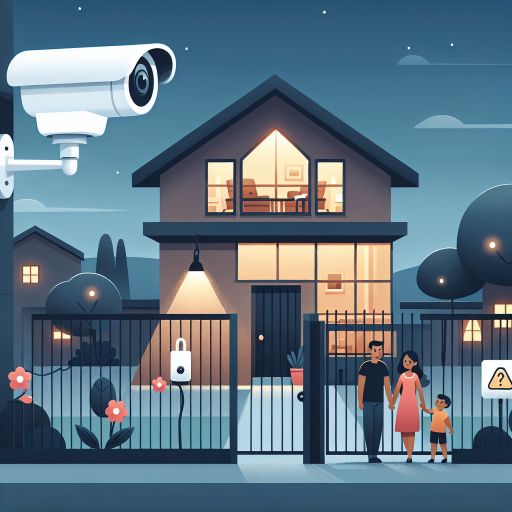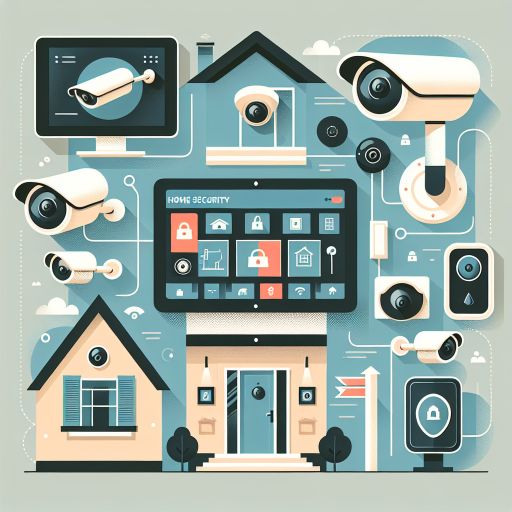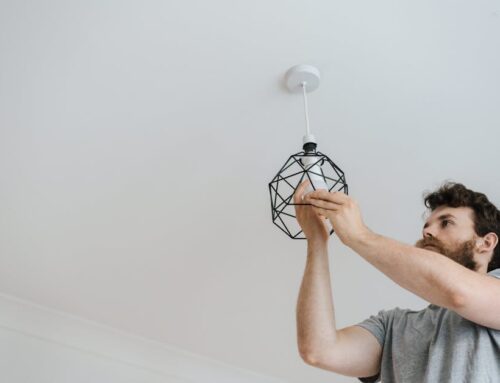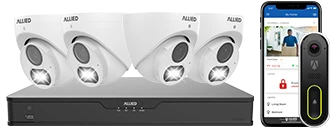Understanding the Importance of Home Security
Home security is a critical consideration for homeowners seeking to protect their property and loved ones. According to the Federal Bureau of Investigation (FBI), a burglary occurs every 23 seconds in the United States, underscoring the importance of having a reliable security system.
There are several compelling reasons for investing in home security:
- Burglary Deterrence: Studies have shown that homes without security systems are up to 300% more likely to be broken into. Visible signs of security, such as cameras and alarm systems, can deter potential intruders.
- Protection of Valuables: A security system can safeguard valuable possessions, including electronics, jewelry, and important documents.
- Emergency Response: Modern home security systems often include features that alert local authorities in the event of a break-in, fire, or other emergency.
- Peace of Mind: Knowing that your home is protected provides peace of mind, whether you are at home or away.
- Insurance Benefits: Many insurance companies offer discounts on homeowners insurance premiums for homes equipped with security systems.
Additionally, advancements in technology have enhanced the effectiveness of home security systems. Features such as smart home integration, remote monitoring, and real-time alerts allow homeowners to manage and monitor their security systems with greater ease and efficiency.
Here’s a brief comparison of burglary statistics before and after implementing a home security system:
| Without Security System | With Security System |
|---|---|
| Up to 300% more likely to be broken into | Significantly less likely to be targeted |
Key Features to Look for in a Home Security System
When choosing a home security system, it is crucial to identify the key features that will best meet your needs. Here are some fundamental aspects to consider:
1. Intrusion Detection
Intrusion detection is a core feature of any home security system. Look for systems that offer:
- Motion Sensors: These detect movement within a specified area and can trigger alarms.
- Door and Window Sensors: These devices alert you when doors or windows are opened.
- Glass Break Sensors: These detect the sound of glass breaking and can provide an additional layer of security.
2. Surveillance Cameras
Surveillance cameras allow for continuous monitoring and recording. Consider the following:
- Resolution: High-definition cameras provide clearer images.
- Field of View: Wide-angle lenses cover more area.
- Night Vision: Infrared technology enables recording in low-light conditions.
- Storage Options: Cloud storage vs local storage on an SD card or DVR.
3. Alarm Systems
Alarm systems are essential for warding off intruders and alerting authorities. Look for systems that include:
- Audible Alarms: Loud alarms can deter intruders and alert neighbors.
- Silent Alarms: These notify the monitoring center without alerting the intruder.
4. Home Automation Integration
Modern security systems often integrate with home automation. Features to look for include:
- Smart Locks: Control locks remotely.
- Lighting Control: Automate lights to give the impression that someone is home.
- Thermostat Control: Adjust heating and cooling remotely.
5. Mobile Access
The ability to monitor and control your security system via a mobile app is highly beneficial. Features to consider are:
- Real-time Alerts: Receive immediate notifications of any security events.
- Remote Arm/Disarm: Enable or disable your system from anywhere.
- Live Video Streaming: View live feeds from your surveillance cameras.
6. Professional Monitoring vs. Self-Monitoring
Home security systems offer professional monitoring or self-monitoring options. Consider the following:
- Professional Monitoring: Services that provide 24/7 surveillance and dispatch authorities when needed.
- Self-Monitoring: Lower cost but requires the homeowner to respond to alerts.
7. Environmental Sensors
Additional sensors can protect against other threats such as:
- Smoke Detectors: Alert you to potential fires.
- Carbon Monoxide Detectors: Detect dangerous levels of CO gas.
- Water Leak Sensors: Prevent damage by detecting leaks early.
When selecting a home security system, consider which features are the most critical for your specific situation. Ensuring that the system you choose is comprehensive and tailored to your needs will provide the best protection for your home
and peace of mind for you and your family.
Evaluating Home Security Companies: What to Consider
When evaluating home security companies, several critical factors must be considered to determine the best fit for your needs. Below are key elements to consider during your evaluation process.
Company Reputation and Reviews
One of the first steps is to research the company’s reputation. Look for online reviews on platforms like Trustpilot, Better Business Bureau (BBB), and Google Reviews. Pay close attention to recurring themes in customer feedback, such as quality of customer service, reliability of equipment, and response times.
Monitoring Services
Understand the type of monitoring services the company offers. Here are the most common types:
- Professional Monitoring: A team of security professionals monitors your system 24/7 and contacts authorities in case of an emergency.
- Self-Monitoring: You are responsible for monitoring your home security system through smartphone apps or other devices.
Professional monitoring is often recommended for higher security, though it comes at an additional cost.
Equipment and Technology
Consider the variety and quality of equipment offered. This typically includes cameras, sensors, alarms, and smart home integration capabilities. Review if the equipment is up-to-date with the latest technology.
Installation Methods
There are two common methods of installation: professional installation and DIY installation. Professional installation guarantees that the system is set up correctly, but comes with an additional cost. DIY installation can be more cost-effective but may require technical know-how.
Customer Support
Reliable customer support is crucial for resolving issues quickly. Check if the company provides multiple support channels such as phone, email, and live chat. Additionally, consider the availability of support (e.g., 24/7) and the average response time.
Compliance and Certifications
Ensure the company complies with industry standards and holds relevant certifications. This could include:
- UL Listed: Equipment tested and confirmed for safety and reliability.
- CSAA Certified: Indicates high standards in alarm monitoring.
Cost and Contract Length
Evaluate the cost structure of the security services, including equipment fees, installation charges, and monthly monitoring fees. Additionally, review the contract length, as many companies require long-term commitments, which can range from 1 to 3 years.
Comparison Table
| Factor | Details |
|---|---|
| Reputation | Based on customer reviews and ratings |
| Monitoring Services | Professional vs. Self-monitoring |
| Equipment | Variety, quality, and technological advancements |
| Installation | Professional vs. DIY |
| Customer Support | Channels, availability, and response times |
| Compliance | Certifications and industry standards |
| Cost | Overall expenses and contract obligations |
Comparative Analysis of Leading Home Security Providers
Comparative Analysis of Leading Home Security Providers
When selecting a home security company, understanding how industry leaders compare is crucial. This analysis focuses on prominent providers based on publicly available data and expert evaluations.
One of the most widely recognized names in home security is ADT. As of 2023, ADT remains a top choice due to its extensive experience, comprehensive coverage, and robust monitoring services. The company operates over 200 local offices and employs more than 20,000 personnel to ensure timely and effective service. ADT has been acknowledged for its advanced technology offerings, including smart home integration and user-friendly mobile apps.
SimpliSafe is another key player in the home security landscape. Unlike traditional systems, SimpliSafe offers a DIY installation approach which appeals to a segment of the market. Known for its straightforward pricing and no-contract model, SimpliSafe provides flexibility and affordability without sacrificing protection. Expert evaluations also note the system’s reliability and ease of use.
Vivint stands out for its innovative home automation solutions. With a focus on smart home integration, Vivint offers an array of high-tech features such as smart locks, thermostats, and voice control compatibility. The company is noted for professional installation and 24/7 monitoring. Some independent reviews highlight Vivint’s cutting-edge equipment but also mention its higher price point and longer contract requirements.
Frontpoint is lauded for customer service and system flexibility. While also offering DIY installation, Frontpoint provides pre-configured systems that simplify setup. The company’s transparent pricing and contract terms appeal to many consumers, and its reputable customer support adds a layer of assurance. Analysts recognize Frontpoint for its reliability and favorable customer reviews.
Lastly, Brinks Home Security, merging the capabilities of former Monitronics and LiveWatch, offers a balance between professional monitoring and smart home features. Brinks provides flexible options for installation and contract terms. The central monitoring stations are UL certified, which indicates a high standard of monitoring infrastructure. Brinks is appreciated for its user-friendly equipment and scalable systems suitable for various home sizes.
In summary, each of these leading companies has unique strengths and potential drawbacks. ADT and Vivint offer extensive options and professional installations, SimpliSafe and Frontpoint provide flexibility and user-friendly DIY systems, and Brinks delivers a balanced approach with comprehensive monitoring services. Evaluating these options in the context of your specific needs and preferences will help in making an informed decision.
Understanding Contracts and Pricing Structures
When selecting a home security company, understanding their contracts and pricing structures is crucial. Costs can vary significantly based on the services and features offered, as well as the length and terms of the contract.
Contract Length: Most home security companies offer contracts ranging from one to five years. A longer contract might come with lower monthly costs, but it could also lock you into a commitment that is difficult to break should your needs change. Conversely, shorter contracts offer more flexibility but often at a higher monthly price.
Installation Fees: Installation fees can add a substantial amount to your initial costs. Some companies may offer free or low-cost installation if you sign a longer-term contract, while others could charge a premium for professional installation services. Be sure to inquire about these fees to understand the full cost outlay.
Monthly Monitoring Fees: This is the ongoing cost that you will pay for the professional monitoring service. These fees can vary widely depending on the level of monitoring. Basic packages usually cover 24/7 monitoring but might not include advanced features like video surveillance or home automation.
Equipment Costs: Equipment costs can be either up-front purchases or included in your monthly fees. While some companies provide equipment at no extra charge as part of their package deal, others may require that you purchase or lease the equipment separately.
Additional Fees: Be aware of any additional fees that might apply, such as for system upgrades, sensor replacements, or moving your system to a new residence. Some companies might also charge for false alarms or have penalties for early contract termination.
Trial Periods and Money-Back Guarantees: Some companies offer trial periods or money-back guarantees, allowing you to test their services before committing long-term. This can be particularly useful if you are uncertain about the company’s offerings.
By carefully examining these aspects of contracts and pricing structures, you can gain a clear understanding of your financial commitment and ensure that the service aligns with your expectations and needs.
Remember to read all contract terms carefully before signing, and don’t hesitate to ask questions about anything that is unclear or seems potentially unfavorable.
How to Make an Informed Decision
Making an informed decision when choosing a home security company involves a thorough evaluation of various factors to ensure that the chosen service aligns with your specific needs and preferences. By assessing the key elements systematically, you can select a provider that offers reliable protection and optimal value.
1. Assess Your Security Needs
The first step is to identify your unique security needs. Consider the size of your property, the local crime rate, and any specific vulnerabilities. For example, larger homes may require more extensive surveillance systems, while areas with higher crime rates might benefit from advanced alarm systems and immediate response services.
2. Research Providers
Extensive research on available home security companies is crucial. Look for providers with a strong reputation, proven track record, and good customer reviews. Pay attention to any awards and certifications, such as the Underwriters Laboratories (UL) certification, which indicates a commitment to quality and safety standards.
3. Compare Features and Technology
Evaluate the features and technology offered by each company. Essential features might include 24/7 monitoring, mobile app integration, motion sensors, security cameras, and smart home compatibility. Compare these features against your identified needs to find the best match.
4. Understand Costs and Contracts
Review the pricing structures and contract terms of potential providers. Take note of all costs, including installation fees, monthly monitoring charges, and any additional fees for equipment or services. Ensure you understand the contract length, cancellation policies, and any guarantees or warranties offered.
5. Check Customer Service and Support
Customer service is a critical factor. A company should offer robust support, including easy-to-reach service representatives and efficient problem resolution. Look for companies with high customer satisfaction ratings in terms of their responsiveness and support effectiveness.
6. Seek Professional Advice
Consulting with security experts can provide valuable insights. Professional advice from an unbiased third party can help clarify complex options and ensure you choose a company that provides optimal security for your home.
7. Read the Fine Print
Before making a final decision, carefully read through all the terms and conditions provided by the security company. Ensure you are fully aware of your commitments, any potential penalties, and the scope of service guarantees.
8. Trust Your Instincts
Finally, trust your instincts. If a company’s representative is pushy or if something feels off, it might be best to continue your search. Your comfort and confidence in the company’s ability to protect your home are paramount.
By following these steps, you’ll be well-equipped to make an informed decision, ensuring that your chosen home security company provides the peace of mind and protection you need for your property and loved ones.












